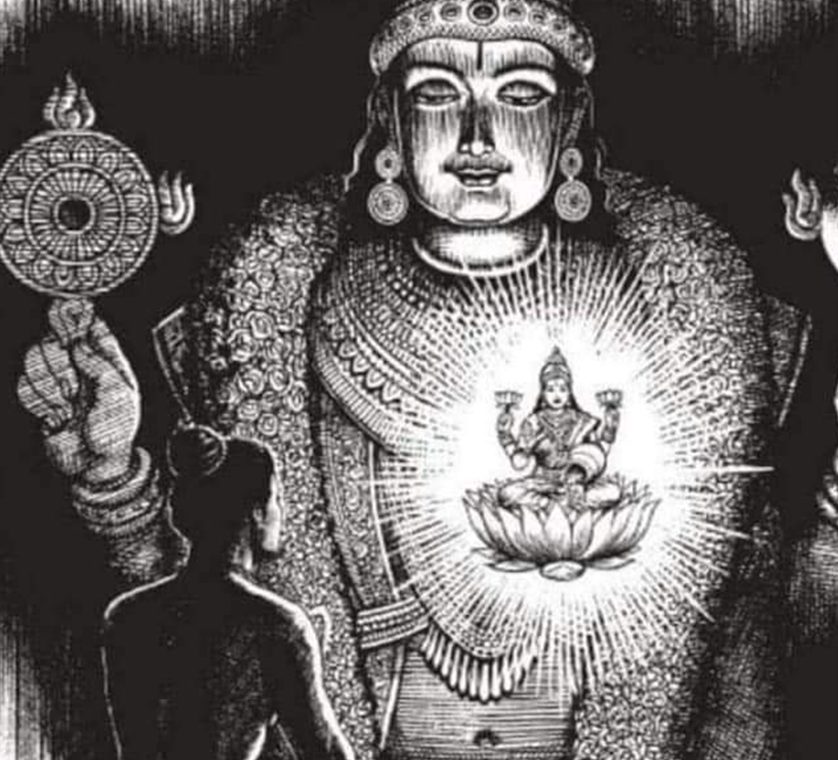Meditation on Maha Vishnu
ॐ शुक्लाम्बरधरं विष्णुं शशिवर्णं चतुर्भुजम् |
प्रसन्नवदनं ध्यायेत् सर्वविघ्नोपशान्तये ||
Om śuklāmbaradharam viṣhṇum śhaśhivarṇam chaturbhujam |
Prasannavadanam dhyāyet sarvavighnopaśhāntaye ||
Om śuklāmbaradharam viṣhṇum
śhaśhivarṇam chaturbhujam |
Prasannavadanam
dhyāyet sarvavighnopaśhāntaye ||
One should meditate on Him who dons a white attire, who is all pervasive, of the colour of the moon, who has four arms and a tranquil face, for the cessation of obstacles.
This verse is generally chanted as a prayer, to invoke the grace of Lord Gaṇeśa as Adi Narayana, before undertaking any work. The Lord is invoked both as Vighnarāja and also as Vighnahara.
Every action attracts two types of results – one that is dṛṣṭa, seen, and the other that is adṛṣṭa, not seen. Dṛṣṭa-phala is enjoyed immediately, whereas, the adṛṣṭa-phala is enjoyed much later, either in this birth or in other birth.
A human being is endowed with a free will. That free will can be used to do what is right dharma. Then, the person incurs an adṛṣṭa-phala called puṇya which in turn manifests as circumstances which will give sukha (comfort and happiness). Or, the free will can be abused and used to hurt other living beings and go against what is right dharma, and thus incur an adṛṣṭa-phala called pāpa. This manifests as circumstances that gives rise to duḥkha (saddness and suffering).
So, the puṇya and pāpa stand in the account of the jiva, the individual, as long as one looks upon himself as a limited person, as a doer and one who enjoys the fruits of actions. In accordance to one’s karma, a person is born at a particular place and time, with a particular parentage and culture. All the karma-phala standing in one’s name cannot be fulfilled in one given birth. A human birth is a mixture of both puṇya and pāpa and every experience has both puṇya and pāpa. One keeps exhausting the puṇya or pāpa on the one hand and on the other hand adds a little more puṇya or pāpa in one’s life.
The results of action are according to the law of karma, which is the manifestation of Īśvara. When one looks at the Lord as the giver of the results of action, He is the presiding deity of the law of karma, and thereby, becomes the giver of the result of action. The law itself is Bhagavān. The individual jiva is a karta and when one performs actions, the results are given, by the Lord. Now let us look at the meaning of these verses in detail.
Invocation Verses
ॐ शुक्लाम्बरधरं विष्णुं शशिवर्णं चतुर्भुजम् |
प्रसन्नवदनं ध्यायेत् सर्वविघ्नोपशान्तये ||
śuklāṁbaradharaṁ viṣṇuṁ śaśivarṇaṁ caturbhujam |
prasannavadanaṁ dhyāyet sarvavighnōpaśāṁtaye || 1 ||
śuklāṁbaradharaṁ
viṣṇuṁ śaśivarṇaṁ caturbhujam |
prasannavadanaṁ
dhyāyet sarvavighnōpaśāṁtaye || 1 ||
Dressed in white you are,
Oh, all pervading one,
And glowing with the colour of moon.
With four arms, you are, the all knowing one
I meditate on your ever-smiling face,
And pray, Remove all obstacles on my way.
यस्यद्विरदवक्त्राद्याः पारिषद्याः परः शतम् |
विघ्नं निघ्नन्ति सततं विष्वक्सेनं तमाश्रये || 2 ||
yasya dviradavaktrādyāḥ pāriṣadyāḥ paraḥ śatam |
vighnaṁ nighnanti satataṁ viṣvakasenaṁ tamāśraye || 2 ||
yasya dviradavaktrādyāḥ
pāriṣadyāḥ paraḥ śatam |
vighnaṁ nighnanti satataṁ
viṣvakasenaṁ tamāśraye || 2 ||
The elephant faced one along with his innumerable attendants,
Would always remove obstacles as we depend on Vishvaksena.
व्यासं वसिष्ठ नप्तारं शक्तेः पौत्रमकल्मषं |
पराशरात्मजं वन्दे शुकतातं तपोनिधिं || 3 ||
vyāsaṁ vasiṣṭhanaptāraṁ śakteḥ pautramakalmaṣam |
parāśarātmajaṁ vaṁde śukatātaṁ tapōnidhim || 3 ||
vyāsaṁ vasiṣṭhanaptāraṁ
śakteḥ pautramakalmaṣam |
parāśarātmajaṁ vaṁde
śukatātaṁ tapōnidhim || 3 ||
I bow before you Vyasa,
The treasure house of penance,
The great grand son of Vasishta.
The grand son of Shakthi,
The son of Parasara.
And the father of Shuka.

